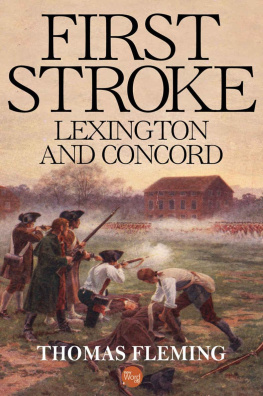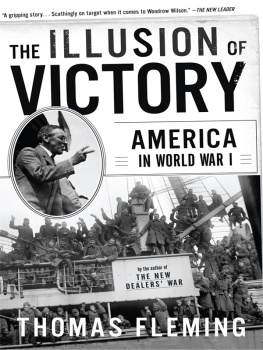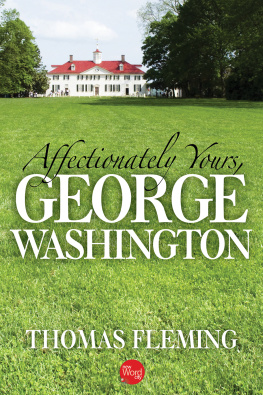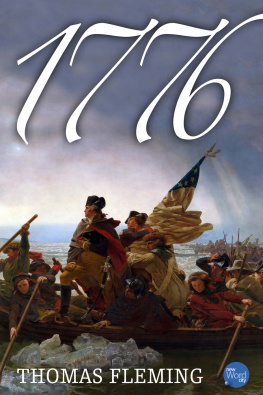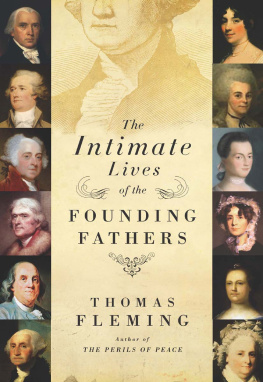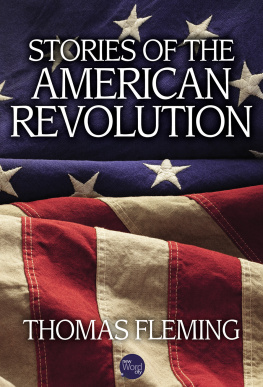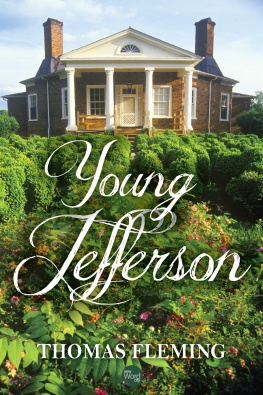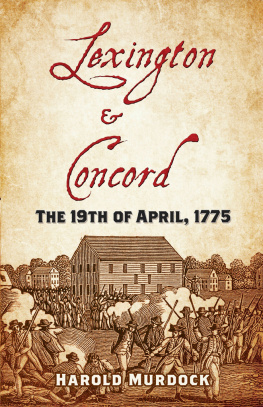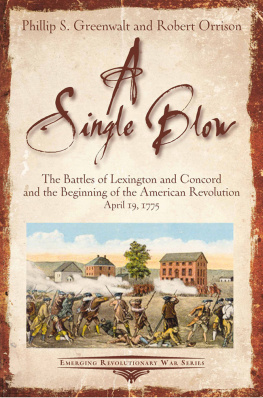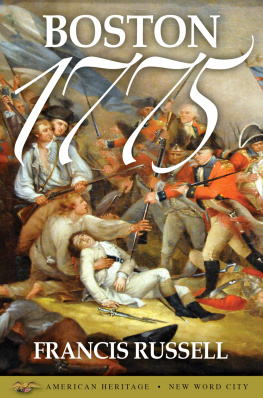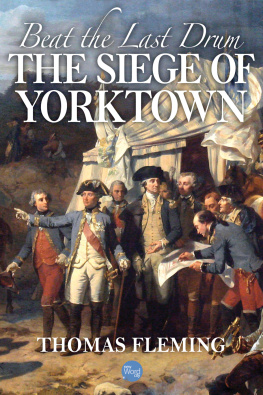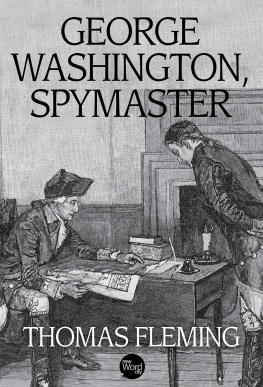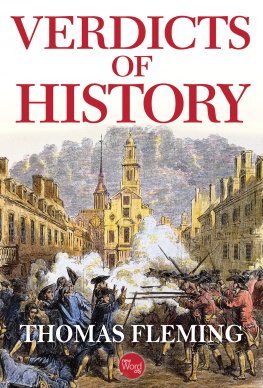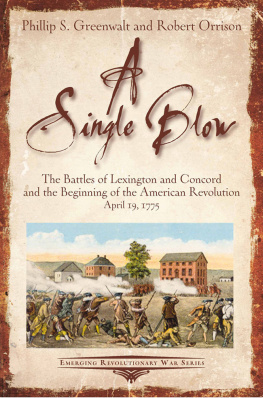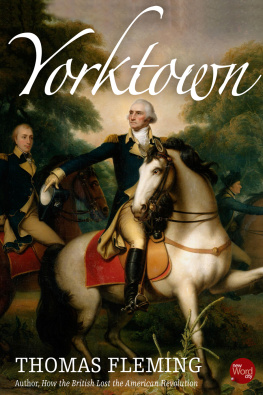On April 19, 1775, in the gray interval between dawn and sunrise, some thirty-eight Americans formed two uneven lines on the wet, dandelion-speckled grass of the triangular two-acre common in the center of Lexington, Massachusetts. They were summoned by the rolling beat of sixteen-year-old William Diamonds brightly painted drum. The order to sound this call to arms had been given by Lexingtons big, burly militia captain, John Parker , forty-five-year-old veteran of the French and Indian War . The men had been waiting all night for the summons, most of them in the Buckman Tavern , a white clapboard building just east of the green. Others hurried from twelve houses that faced three sides of the green. As more men joined the ranks, Captain Parkers numbers grew to approximately seventy, still considerably short of the 130 names on his muster list.
William Diamonds drum had rolled, and Parkers men had formed up in response to a shouted warning from a rider Captain Parker had sent out to scout the Boston road. A British column, the excited man said, was only fifteen minutes away and marching fast.
Parker and his men were on the north end of the common close to where one branch of the Boston road led to Bedford. Another branch, leading to Concord, bent left past the opposite side of the common. Their view of the fork, from which the road ran to Boston eleven miles away, was blocked by the towns bulky two-and-one-half-story meeting house, where they gathered on Sundays to hear their minister, the Rev. Jonas Clarke , tell them the British were plotting to deprive Americans of their liberty and it was every mans sacred duty to resist them.
Although they had guns in their hands, these men of Lexington were not regular soldiers. They wore their everyday clothes - loose brown or gray homespun cloth coats and leather or cloth knee breeches. They elected their officers once a year and wrote their own rules and regulations, which included a fine of three shillings for any person of the Company that shall Interrupt the Capt[ain] or Commanding Officer while under Arms by talking laughing or any Indecent Behavior. About a quarter of the men were related to Captain Parker by blood or marriage. Most of the men came from families that had been living in Lexington for several generations, and almost all shared some degree of kinship. The company clerk, Daniel Harrington, whose house stood only a few steps from the common, was a son-in-law of sixty-three-year-old Robert Munroe, one of the companys ensigns (the eighteenth-century equivalent of a second lieutenant). Another Harrington - Jonathan - lived in the house next door, with his wife and small son. Thirty-eight-year-old William Tidd, the companys lieutenant, was also married to one of Ensign Munroes daughters. The men included grandfathers like Jonas Parker, the captains cousin, and Moses Harrington, who were there with their married sons. Six younger men such as John Muzzy were also there with sons in their teens or early twenties.
Incongruous among the two rows of white faces was the glistening black skin of the slave, Prince Estabrook . He had become a member of the company by majority vote, in accordance with the regulation that any Person Desiring to be Admitted... shall have a vote of the Company for the same....
If Captain Parker and his men had any plan, it was to keep as far away as possible from the Concord road. They knew Concord was the British columns destination, and earlier in the evening, when the first alarm was brought to Lexington by riders from Boston, they had been told the British numbered between 1,200 and 1,500 men. Captain Parker and his men had conferred and decided not to... meddle or make with [the] Regular troops.
The Lexington men heard hundreds of feet striking the ground with military precision. Parker and his company waited, their eyes on the Concord road. At any moment, they thought they would see it full of red-coated infantry. But around that side of the meeting house came only a single British officer on horseback, gesturing with a sword, followed by at least three other mounted officers. Around the Bedford Road side of the meeting house came six companies of red-coated British light infantry, three abreast, twelve men to a file. Beside them were at least six civilians they had captured on the road.
There was a split-second pause in the British pace. Then the light infantry raced toward the Americans, shouting furiously, the two lead companies forming a line of battle twelve abreast and three deep. The officer waving the sword was Major John Pitcairn of the Royal Marines. He was in command of these light infantrymen, traditionally the most agile and active soldiers in their regiments. Lay down your arms, he shouted to Parkers men. From the other officers on horseback came contradictory commands. Disperse, ye rebels! one roared. Surrender, cried another. Damn them we will have them, bellowed a third.
The appalled Captain Parker turned to his men and told them to disperse without firing. Most of them began to scatter, some at a slow, grudging pace, others more quickly. Old Jonas Parker and a few others hesitated. Grandfather Parker had vowed never to retreat if the British attacked them.
Surround them, shouted Pitcairn to the charging light infantrymen. But they were not listening to him nor to anyone else. No one knows how the shooting began or who fired the first shot. Pitcairn later said he thought he saw a gun held by a man behind a stone wall on the edge of the green flash in the pan. (The powder in the muskets firing pan ignited but not the cartridge in the barrel, so the gun failed to go off.) American witnesses - there were about forty men, women, and children standing around the green or watching from the windows and doorways of the adjacent houses - say one of the British officers on horseback fired a pistol. If either occurred, it only confirmed the intentions of the light infantrymen from the moment they saw Parkers men facing them on the common.
No one knows for certain if the red-coated soldiers in the two lead companies followed the drill-book routine which they had practiced hundreds of times in Boston during the preceding months. If they did, the men in the two lead companies stopped a few dozen yards from Parkers men and the second rank stepped a half pace to the right. The third rank stepped another half pace to the right. This gave every man in the two companies a chance to fire without hitting the soldier in front of him. Eyewitness comments about a ragged fire suggests that excitement may have prevented them from performing this maneuver with precision. But within a few seconds, the soldiers of the two lead companies began blasting away at the Lexington men.
A huge billow of white gunsmoke swirled in the murky dawn air as murderous bullets tore into Captain Parkers volunteers. Ensign Robert Munroe was dead when he hit the ground. A cousin, John Munroe, gasped as a bullet smashed his arm. Young Isaac Muzzy died at his fathers feet. Jonathan Harrington, hit in the chest, crawled painfully to the doorstep of his house and died there, before the eyes of his horrified wife and son.
A wild melee erupted as Parkers men began firing back. A number of men who had lingered in the Buckman Tavern opened fire from the first- and second-floor windows. More guns boomed from the windows of other houses around the common. The rear companies of light infantry stormed into the fight, some returning the shots from the tavern and houses, others charging Parkers men with lowered bayonets.

